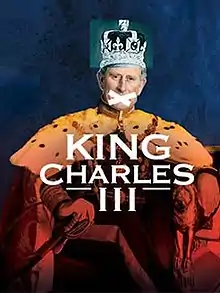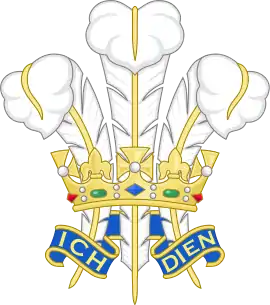King Charles III (play)
King Charles III is a 2014 play in blank verse by Mike Bartlett. It was premiered at the Almeida Theatre, London, in April 2014 and centres on the accession and reign of King Charles III of the United Kingdom, the possible regnal name of the real Charles, Prince of Wales, and the limiting of the freedom of the press after the News International phone hacking scandal.
| King Charles III | |
|---|---|
 Artwork for the original London and Broadway productions. | |
| Written by | Mike Bartlett |
| Date premiered | 10 April 2014 |
| Place premiered | Almeida Theatre, London |
| Genre | Drama Future history |
| Setting | London, United Kingdom in the future |
A 90-minute television adaptation was broadcast on BBC Two on 10 May 2017.
Production history
Its premiere production was at the Almeida Theatre from 10 April to 31 May 2014, with previews from 3 April, directed by Rupert Goold.[1] Charles was played by Tim Pigott-Smith,[2] whilst the cast also included Margot Leicester as Camilla,[3] Oliver Chris as Prince William, Lydia Wilson as Kate, Richard Goulding as Prince Harry,[4] Adam James as the Prime Minister and Nicholas Rowe as the Leader of the Opposition.[5]
The production transferred to the West End's Wyndham's Theatre in September 2014 for an initial three-month run,[6] later announcing an extension to the end of January 2015.[7] When Pigott-Smith sustained a broken collar bone, he was replaced for five weeks by Miles Richardson.[8]
Following its West End run, the play began a UK tour at the Birmingham Repertory Theatre with Robert Powell in the role of Charles in September 2015, ending with a month run by the Sydney Theatre Company (at the Roslyn Packer Theatre) making its Australian premiere in March 2016.[9]
The play transferred to Broadway for a limited engagement with the original London cast, running at the Music Box Theatre from 1 November 2015 until 31 January 2016, following previews from 10 October 2015.[10][11]
A typical performance ran for two hours and forty-five minutes, including one interval.[1]
A newly mounted production of the play directed by David Muse with Robert Joy as King Charles began 7 February 2017 at the Shakespeare Theatre Company in Washington D.C.[12]
Cast
| Role | Almeida Theatre | West End | Broadway | UK Tour | Sydney | Television Film |
|---|---|---|---|---|---|---|
| Charles | Tim Pigott-Smith | Robert Powell | Tim Pigott-Smith | |||
| William | Oliver Chris | Ben Righton | Oliver Chris | |||
| Harry | Richard Goulding | Richard Glaves | Richard Goulding | |||
| Kate | Lydia Wilson | Jennifer Bryden | Charlotte Riley | |||
| Camilla | Margot Leicester | Penelope Beaumont | Carolyn Pickles | Margot Leicester | ||
| Jess Edwards | Tafline Steen | Lucy Phelps | Tamara Lawrance | |||
| James Reiss | Nick Sampson | Miles Richardson | Dominic Jephcott | Tim McMullan | ||
| Prime Minister Tristram Evans | Adam James | Tim Treloar | Adam James | |||
| Mark Stevens (play)/Mrs Stevens (film), Leader of the Opposition | Nicholas Rowe | Anthony Calf | Giles Taylor | Priyanga Burford | ||
| Sarah / Ghost / TV Producer | Katie Brayben | Sally Scott | Beatrice Walker | Katie Brayben | ||
| Coottsey / Speaker of the House of Commons / Sir Michael | Tom Robertson | Paul Westwood | Max Bennett / Ian Redford / Rupert Vansittart | |||
| Spencer / Nick / Sir Gordon | Nyasha Hatendi | Parth Thakerar | Geoffrey Lumb | Parth Thakerar / Tom Mothersdale / Nyasha Hatendi | ||
| Protesters / Attendants / Understudies | Edward Elgood, Joe Eyre, Elinor Lawless, Peter Collis, Emily Swain | Lucas Hall, Rachel Spencer Hewitt, Peter Bradbury, Gordana Rashovich, Harry Smith | Emily Swain, Emily-Celine Thompson, Ryan Whittle, Karl Wilson | |||
Plot
Charles and his family gather following the funeral of Queen Elizabeth II. Charles, as the new king, then holds his first weekly audience with the Prime Minister. They discuss a new Bill for statutory regulation of the press, which has passed the House of Commons and the House of Lords and awaits only Charles's royal assent to become law. Charles is concerned that the law restricts freedom of the press too much, and would allow governments to censor the news and prevent legitimate uncovering of abuse of power by the government. He asks the Prime Minister for alterations to the bill, but the Prime Minister refuses. The two men spar, as the Leader of the Opposition arrives for a weekly meeting with Charles, an innovation the new king has introduced. The Leader of the Opposition expresses his own doubts on the bill, but he sees little alternative but for Charles to sign.
In parallel, Prince Harry has begun a relationship with Jess Edwards, a republican. Both Charles and Prince William have seen the ghost of Princess Diana, promising each man that he will become "the greatest king of all". One of his first actions is to refuse to give royal assent to the press regulation bill. The Prime Minister holds a crisis meeting with the Leader of the Opposition and then goes alone to try to convince Charles to sign, but Charles continues to refuse. The Prime Minister then threatens to pass a new law bypassing the royal assent and then pass the press law, but Charles then dissolves Parliament before the Prime Minister can bring either of these plans into effect.
Protests begin across the country and especially in London. Charles increases the army guard at Buckingham Palace, offers his protection to Jess (whom the press have made the centre of a sex scandal), and agrees to Harry's wish to become a commoner. The Duchess of Cambridge (Prince William's wife Kate) proposes a solution: William will serve as a mediator between Parliament and his father. William announces this plan at a press conference without his father's knowledge or consent. Seeing this as a betrayal, Charles reacts angrily. Ultimately, Charles is forced to abdicate in favour of William, who plans to sign the press bill and restore the status quo between king and Parliament. The play concludes with Harry's rejection of Jess, and William and Kate's coronation as king and queen consort.
Critical reception
The London and Broadway productions have both received positive reviews.[13][14]
The Telegraph's review on this play says, “attendance is compulsory’. It is said this is the best playwright work Mike Barlett has done yet. The thrills and plot twists of the play should remain a secret to those who have not been exposed yet to the reading.[15]
The Globe and Mail called the play "dreary" despite its success in London and on Broadway. It is explained to be a Shakespearean-like play that has already passed its “best before” date. The author talks about how some aspects in this futuristic play came true, like how Prince Harry ends up happy with his new spouse Meghan Markle, who like Jess is also of African descent. There is also how the real Prince Charles is known to be involved with government issues and having strong opinions.[16]
Awards and nominations
Original London production
| Year | Award | Category | Nominee | Result |
|---|---|---|---|---|
| 2014 | Critics' Circle Theatre Award[17] | Best New Play | Mike Bartlett | Won |
| 2015 | Laurence Olivier Award | Best New Play | Won | |
| Best Director | Rupert Goold | Nominated | ||
| Best Actor | Tim Pigott-Smith | Nominated | ||
| Best Actor in a Supporting Role | Richard Goulding | Nominated | ||
| Best Actress in a Supporting Role | Lydia Wilson | Nominated | ||
| Best Lighting Design | Jon Clark | Nominated | ||
| South Bank Sky Arts Award | Theatre | Won | ||
Broadway production
| Year | Award | Category | Nominee | Result |
|---|---|---|---|---|
| 2016 | Drama Desk Award[18] | Outstanding Play | Nominated | |
| Outstanding Actor in a Play | Tim Pigott-Smith | Nominated | ||
| Outstanding Director of a Play | Rupert Goold | Nominated | ||
| Tony Awards[19] | Best Play | Nominated | ||
| Best Performance by an Actor in a Leading Role in a Play | Tim Pigott-Smith | Nominated | ||
| Best Performance by an Actor in a Featured Role in a Play | Richard Goulding | Nominated | ||
| Best Costume Design of a Play | Tom Scutt | Nominated | ||
| Best Direction of a Play | Rupert Goold | Nominated | ||
Radio adaptation
The stage play was adapted into a radio play for BBC Radio 3's Drama on 3 and broadcast 12 July 2015, starring the cast of the original West End production.[20] It was re-broadcast on 6 November 2016, again on BBC Radio 3.
TV film adaptation
The play was adapted into a 90-minute TV film for BBC Two and Masterpiece on PBS.[21] The adaptation first aired on BBC Two on 10 May 2017.
Before the film had even aired, politicians and biographers already did not like the idea of a non-fiction futuristic world without the Queen. After viewing the play as a whole, it was seen as more of a political thriller and tragedy. The TV film is an hour shorter than the play time due to a few parts being removed from the original script.[22]
References
- "King Charles III". almeida.co.uk. Almeida Theatre. Retrieved 9 May 2015.
- Curtis, Nick (2014-04-03). "What would happen if Prince Charles was made king?". Evening Standard. Retrieved 2014-04-04.
- Sarah Hemming, "King Charles III, Almeida Theatre, London", Financial Times (London), April 11, 2014. Retrieved 15 May 2014
- Billington, Michael (2014-04-11). "King Charles III – a flawed premise but royally entertaining". The Guardian. Retrieved 2014-04-11.
- Charles Spencer, "King Charles III, review: 'spectacular, gripping and wickedly entertaining'", Telegraph (London), 11 April 2014. Retrieved 15 May 2014
- Mitford, Oliver (2014-05-28). "King Charles III to transfer to Wyndham's Theatre in the Autumn". Retrieved 2014-05-30.
- "King Charles III extends to January 2015". whatsonstage.com. Whats On Stage. 18 September 2014. Retrieved 18 September 2014.
- "Tim Pigott-Smith bows out of London play due to injury". Express Newspapers. 19 October 2014. Retrieved 22 November 2014.
- Kenny, Fred. "King Charles III UK Tour, Broadway & Sydney | News | Almeida | About Us". almeida.co.uk. Retrieved 2015-10-03.
- "Olivier Award-Winning Prince Charles Satire King Charles III to Reign on Broadway". playbill.com. Playbill. 13 April 2015. Retrieved 9 May 2015.
- Staff. "The Verdict: Read Reviews for Olivier Award Winning 'King Charles III' on Broadway" Playbill, 1 November 2015
- Page-Kirby, Kristen (2 February 2017). "'King Charles III' at Shakespeare Theatre Company puts Charles in charge". The Washington Post. Retrieved 16 February 2017.
- "King Charles III, Wyndham's Theatre, review: 'attendance is compulsory'". The Daily Telegraph. London. 3 October 2014. Retrieved 29 April 2016.
- "King Charles III review – provocative drama tells a 'future history'". The Guardian. New York. 2 November 2015. Retrieved 29 April 2016.
- "King Charles III, Wyndham's Theatre, review: 'attendance is compulsory'". The Daily Telegraph. London. 3 October 2014.
- "Review: 'Future history' play King Charles III is dreary, lacks imagination" Toronto: The Globe and Mail. 16 February 2018.
- "2014 Results | Critics' Circle Theatre Awards". 2016-11-28. Retrieved 2020-12-06.
- Viagas, Robert. "'She Loves Me' Leads Drama Desk Nominations" Playbill, 28 April 2016
- "See Full List of 2016 Tony Award Nominations" Playbill, May 3, 2016
- "Drama on 3: King Charles III - BBC Radio 3". BBC. Retrieved 2016-04-08.
- "King Charles III on BBC Two | News | Almeida | About Us". almeida.co.uk. Retrieved 2016-04-08.
- "Stop frothing, royalists- King Charles III is the boldest BBC show of the year".The Guardian, 10 May 2017
